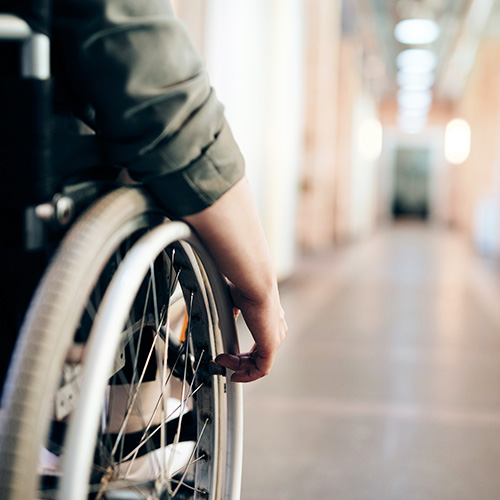You may be under the impression that people with physical disabilities are a small minority but actually, one in twenty people has some form of disability that makes traditional mobility more challenging for them.
What are my legal obligations regarding disabled access?
In the UK the Equality Act 2010 (replacing the 1995 Disability Discrimination Act) calls on employers, businesses, local authorities and schools to take positive steps to ensure barriers that people with disabilities face are removed. This can include policies, rules and practices but the most prevalent issues are related to physical features of a building that make it difficult to navigate for someone using a wheelchair or with another disability.
The most common difficulties are with stairs and steps, passageways and paths, toilets and entrances and exits. Reasonable adjustments that can be made include providing ramps and stairway lifts, widening doorways and installing automatic doors.
What happens if I don't make reasonable adjustments?
"Reasonable adjustments" means that efforts should be made to ensure disabled people are not placed at a substantial disadvantage in comparison to non-disabled people. There are many factors that determine how reasonable an adjustment is including practicality, the financial cost to the business, disruption and the effectiveness of the change.
For example; if the changes required to allow a wheelchair user to access a very narrow historic building would be so extensive that the business could not afford to make them and continue operating this would not be considered reasonable. However, if a large business refused to install a small access ramp with no justification this would be considered unlawful discrimination. Common sense is key.
If a person with a disability tries to use your premises but struggles to navigate it the Equality Act deems this as unlawful discrimination. They are in their right to ask the business or organisation to make the necessary changes. If this is refused they can then make a discrimination claim under the Equality Act.
What is the best door for offering disabled access?
Whilst manually operated sliding doors are far easier for wheelchair users to navigate than an old fashioned hinged swinging door an automatic door is the way to go for complete convenience of access.
An automatic door can be triggered by either a sensor of some variety (motion, pressure, infrared or optical), a pressure plate or a push button that can be located in an easy to reach location for someone in a wheelchair.
Once an automatic door has been triggered it remains open for an appropriate amount of time which allows a person in a wheelchair or with other mobility issues to easily pass through the entrance. It is recommended that doors designed for wheelchair access are at least 85cm / 33.5" wide, which is a little wider than most standard doors but makes access easier.
Sliding automatic doors are the ideal and by far the easiest form of entry for disabled users. Not only do they provide enough clearance for wheelchairs but they are far safer than a swing door. Sliding automatic doors also provide a wealth of benefits on top of offering convenient access - they save space, they can enhance security, they look attractive and professional and they are far more hygienic than a door that needs to be touched by everyone using them.
However, it is recognised that it is not always possible to fit this type of door due to constraints with the structure of the building.
Whilst sliding automatic doors usually require a full installation nearly any door can be quickly converted into an automated swing door opened using a touchpad.
There are many considerations to take into account when installing an automatic door system designed for disabled access. Some of the things our engineers consider when installing a new entry and exit system include:
- Are push pads located at a height convenient for people with disabilities, wheelchair users or smaller people to reach? We usually position them one meter from the ground.
- Are entrance mats or pressure pads flush with the floor so as not to catch wheels or trip people up?
- Once triggered does the door or doors open long enough for someone with a disability to comfortably enter?
- Is the door space wide enough to accommodate a wheelchair? In some cases, a set of double doors or even a telescopic opening door system may be advantageous.
- Are clear glass doors fitted with safety markings to prevent people from walking into them?
- In the event of an emergency the doors should open fully and not obstruct evacuation from the building.
Reactive Doors
If you're thinking about installing an automatic door of some variety you can't do better than Reactive Doors. We specialise almost entirely in the installation, repair and maintenance of automated door systems and have fitted them all over the world for businesses large and small.

